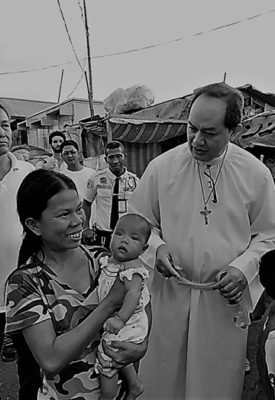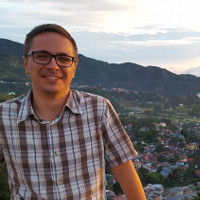 What is our reaction when we hear the term “missionary”? Perhaps we instinctively think of a priest or a religious person who leaves his land to “evangelise” in distant ones. This was the most common idea of “mission” until a few decades ago.
What is our reaction when we hear the term “missionary”? Perhaps we instinctively think of a priest or a religious person who leaves his land to “evangelise” in distant ones. This was the most common idea of “mission” until a few decades ago.
More recently, the term has gained a broader meaning and has begun to include all those baptised, extending the definition to more familiar contexts such as our deeply secularised Western world.
The term “mission” comes from the Latin “missio” meaning “to send”. We are all sent to spread the Good News we have encountered in our lives. In a certain sense, we are all called to be “apostles”, “to be sent”.
But the question I ask myself is: Do we honestly still believe it? Do we still believe that our Faith can be meaningful, that it can change for the better the lives of many who do not know it, or who have forgotten it?
All the baptised are called to be “missionaries”, that is, people who evangelise. If the evangelising drive fails, the Church loses her raison d’être. This is what the Second Vatican Council, Pope Paul VI, Pope John Paul II, and most recently Pope Francis’s Apostolic Exhortation, Evangelii Gaudium, have all expressed.
But do we really believe it? Wouldn’t it be easier to be just among ourselves, with “few people but good ones”, with our groups, with our activities, without bothering others who are “not interested” in what we have to offer? Logic and numbers seem to add up against us. Yet, as we often like to remember, the “fire” of Christianity was lit by just a few ardent apostles. It’s all about keeping this spark alive.

In recent times, this spark has taken on the appearance of an experience and a face, that of Filipino Bishop Pablo Virgilio David (to his flock simply, “Bishop Ambo”) of the diocese of Kalookan, a populous and problematic suburb in the huge urban conglomerate of Manila.
We invited him to the Loyola School of Theology in Manila to share his experience as bishop in a “demanding” diocese where extreme poverty reigns supreme, and where the “war on drugs” launched by President Duterte continues to take away more lives, too many that the media no longer consider it news worthy. But those lives lost are accounted for one by one on Bishop Ambo’s Facebook page.
On record, the Philippines is the Asian country with the highest number of Catholics. Yet if you look at the data of participation in the sacraments, no more than 15 to 20 per cent of believers regularly participate in the life of their parish. Most Filipino Catholics actually live their faith privately, going by devotions and simple prayers.
They are “unchurched”, not reached by the Church. The official Church is not looking for them, and they, for their part, no longer care about the Church. The majority of whom face situations of poverty.
In the face of this challenge, Bishop Ambo is responding by organising his diocese as a real “mission land”. Alongside the traditional parishes are a good number of mission stations. The role of these stations entrusted to various religious orders, including the Jesuits, with the great and passionate collaboration of many locals, is to establish a tangible presence of the local Church for many poor people who feel excluded from it.
Before drawing up elaborate pastoral programmes, Bishop Ambo understood that the first step is more essential: guaranteeing the Church’s presence to people who think they are not culturally, economically or morally worthy.
 Weighing his words well and not without emotion, Bishop Ambo said his dream is that of a truly “incarnate” Church, just like her Lord.
Weighing his words well and not without emotion, Bishop Ambo said his dream is that of a truly “incarnate” Church, just like her Lord.
His speech touched me deeply and made me reflect. It brought me back to Italy and to our tired and ultra-secular Europe. We often complain about the numerical collapse of the faithful in our churches, the decline in vocations to priestly and religious life, the irrelevance of Catholics in social and political life, and, yet, it seems to me that an even more fundamental question eludes us: Do we actually look for these people on the margins or those radically far from the Faith? Do we believe that the message we can bring them is true, beautiful, and worthy of being shared?
Obviously it is not a matter of forcing anyone to believe, much less harassing them with a desire for proselytism. But to witness in an honest way to the joy of our Faith, to experience the joy of the Gospel (as Pope Francis would say). The first step, before any other high-sounding project, is to go back to being there for the people.
Italy is certainly very different from the Philippines. The process of secularisation, or even “de- Christianisation”, whereby every discourse on God is dismissed with indifference, or insufficiency, or with a more or less accentuated sense of contempt, is at a much more advanced stage.
The type of spiritual poverty we ordinarily face requires a missionary ardour equal to that of Bishop Ambo’s. Many of our brothers and sisters who are distant from the Faith are so out of their free choice, but it is often also because of our neglect, for the lack of our real presence among them.
That is why perhaps the Church has lost so much of her authority. She has lost the patience of being with and listening to those who are on the margins. And without prior presence and listening, no teaching, let alone no condemnation can be taken seriously.
How can we be present again on the peripheries of our believing community? What “mission stations”, real or ideal, should we implant in our local Churches? So many dreams and so few concrete answers to these questions at the moment. For now, I want to thank Ambo David, a poor bishop of a poor diocese “at the end of the world”, for having rekindled in me the spark that can make the fire of the mission not only possible, but true and ardent.
 Cesare Gabriele Sposetti SJ is a scholastic from Italy studying theology at the Loyola School of Theology in Manila. He lives with 44 other formands from Asia and Africa in Arrupe International Residence. This article first appeared on Project 22, the blog of the scholastics of the Euro-Mediterranean Province.
Cesare Gabriele Sposetti SJ is a scholastic from Italy studying theology at the Loyola School of Theology in Manila. He lives with 44 other formands from Asia and Africa in Arrupe International Residence. This article first appeared on Project 22, the blog of the scholastics of the Euro-Mediterranean Province.

